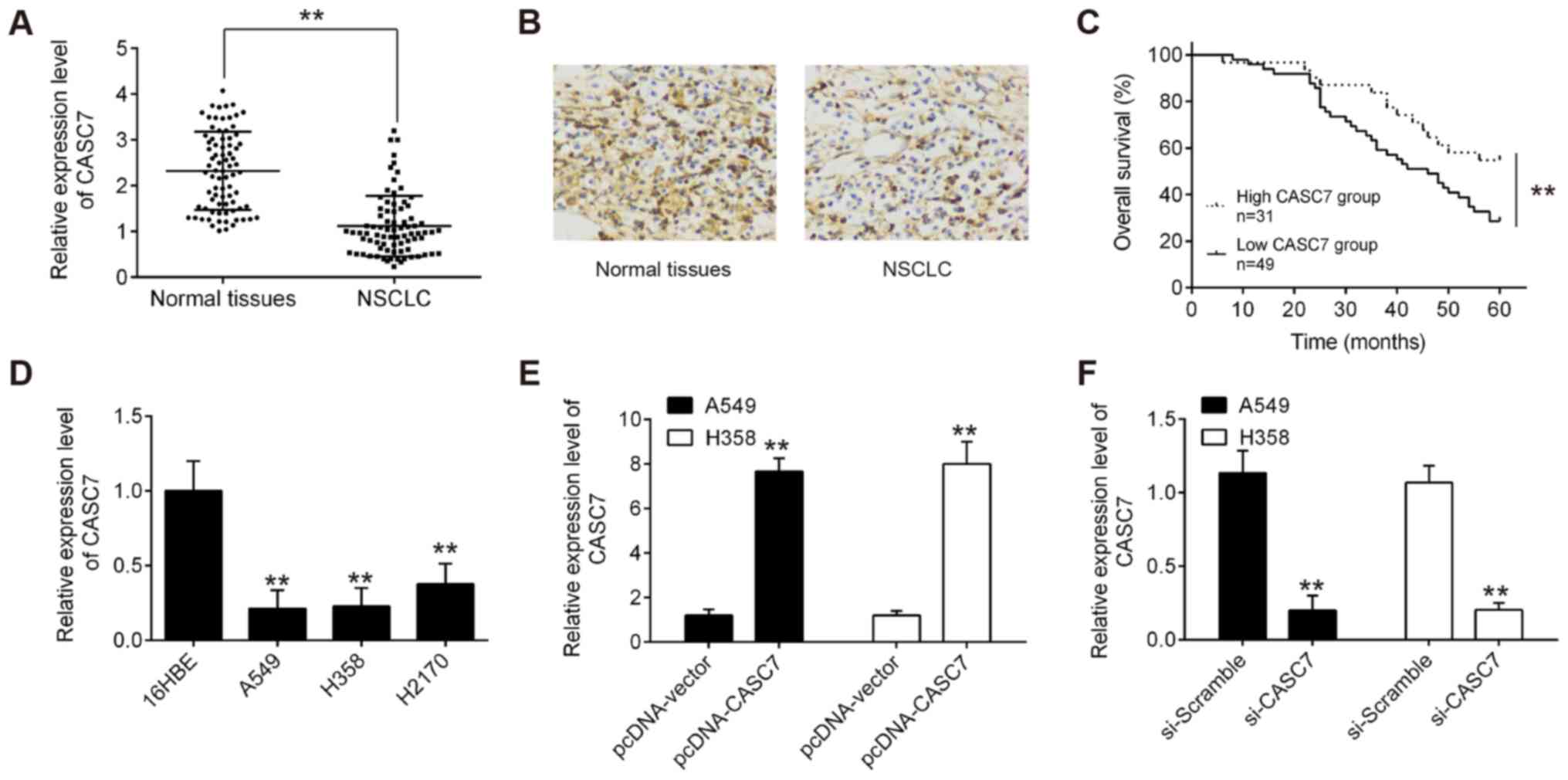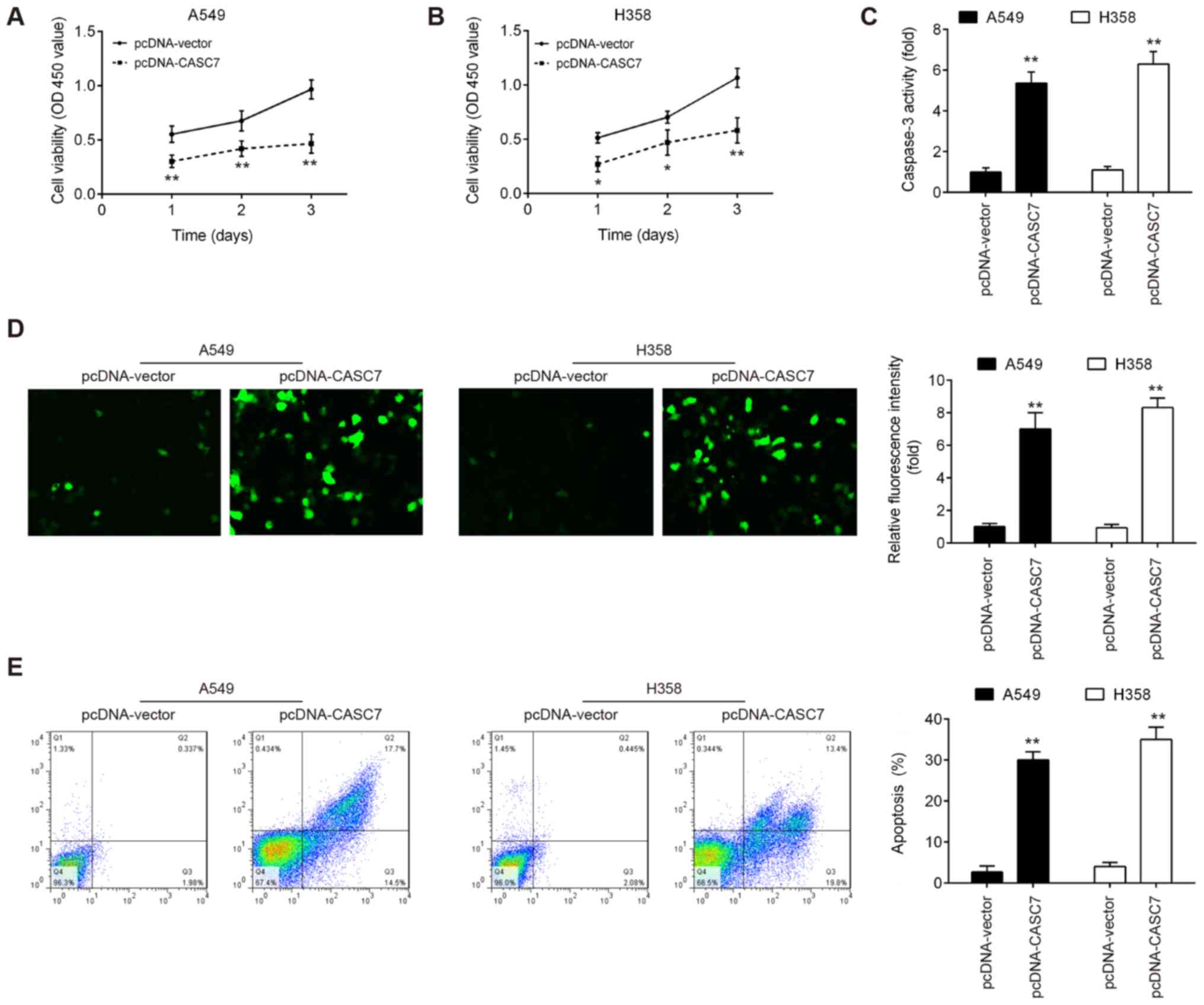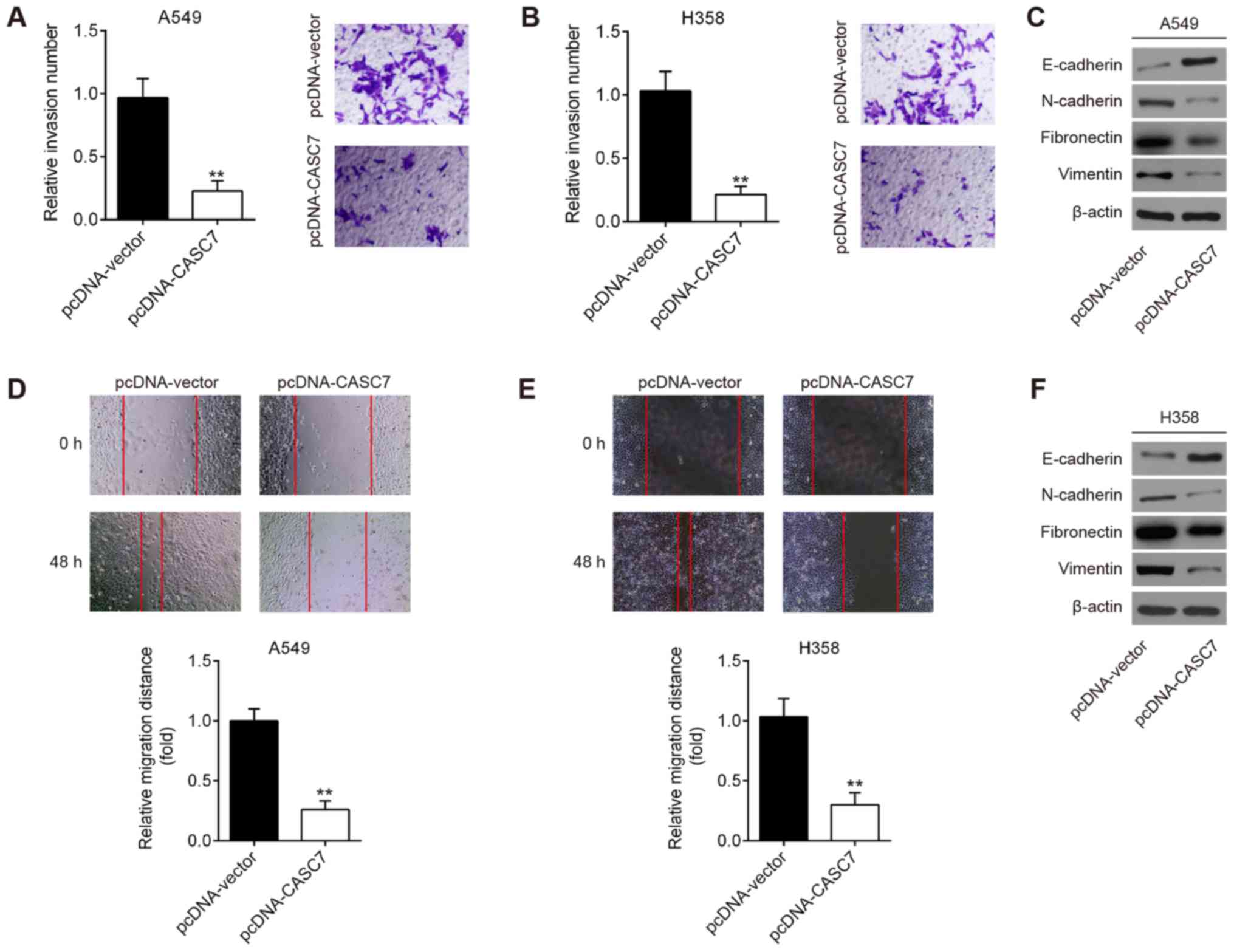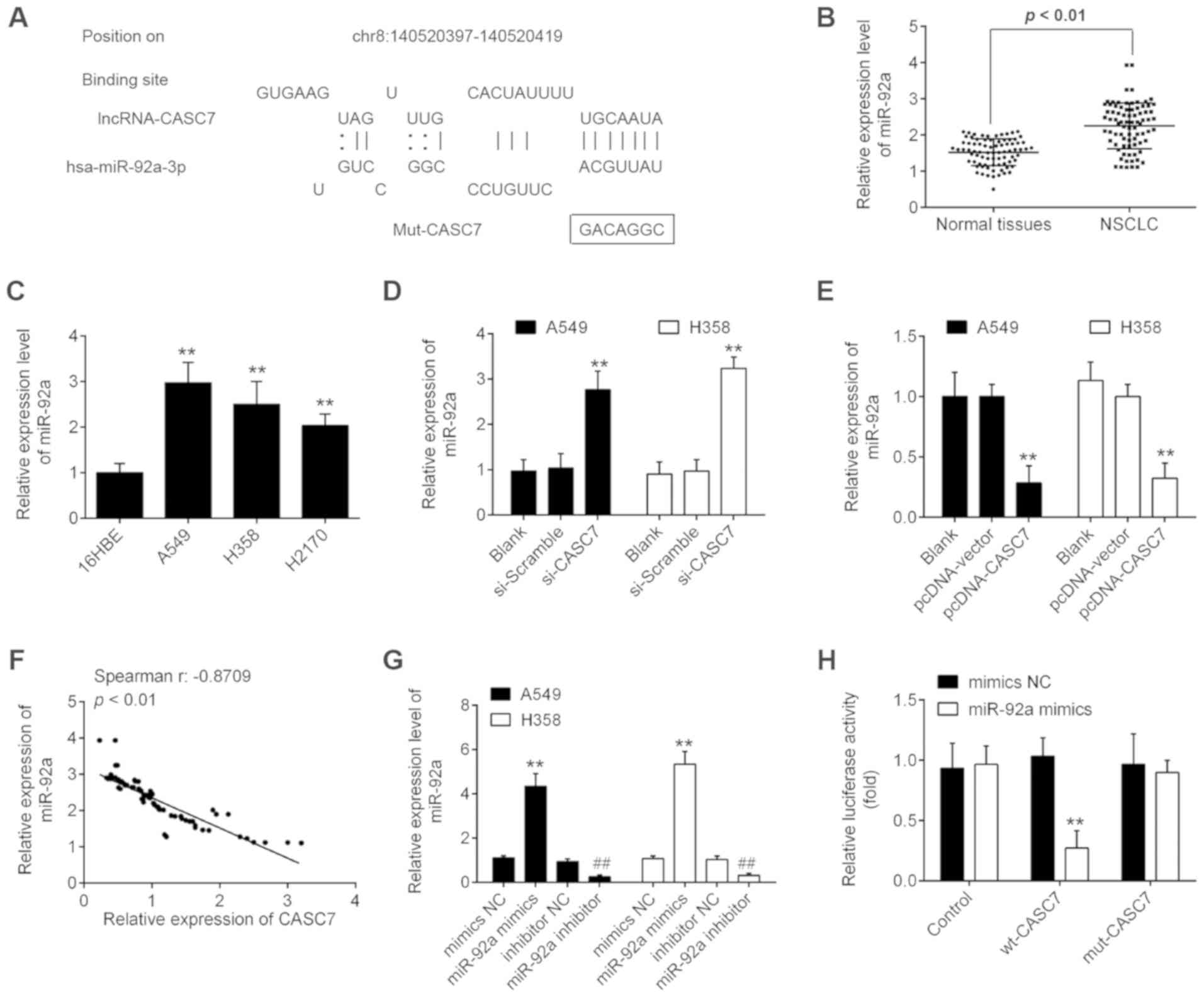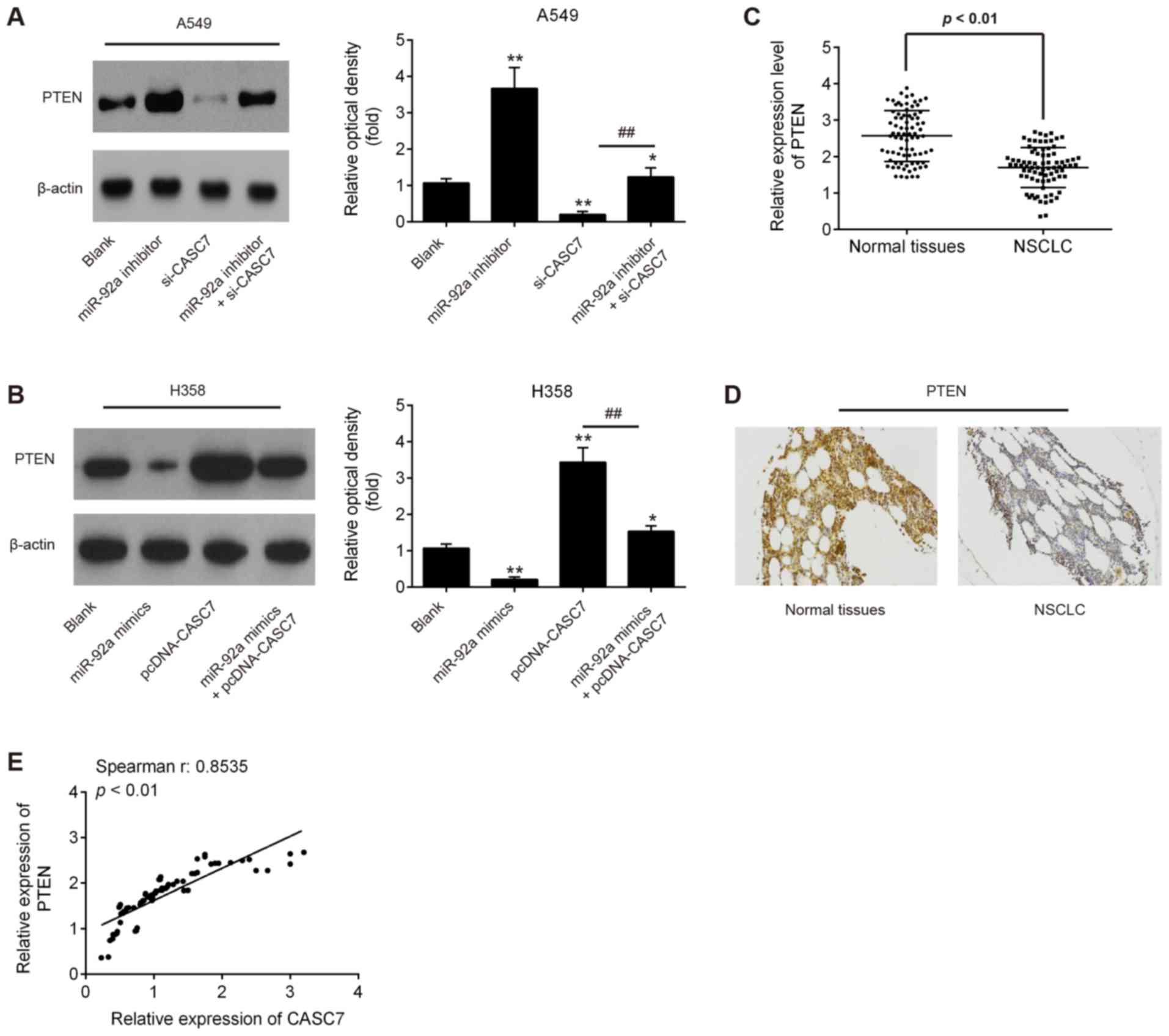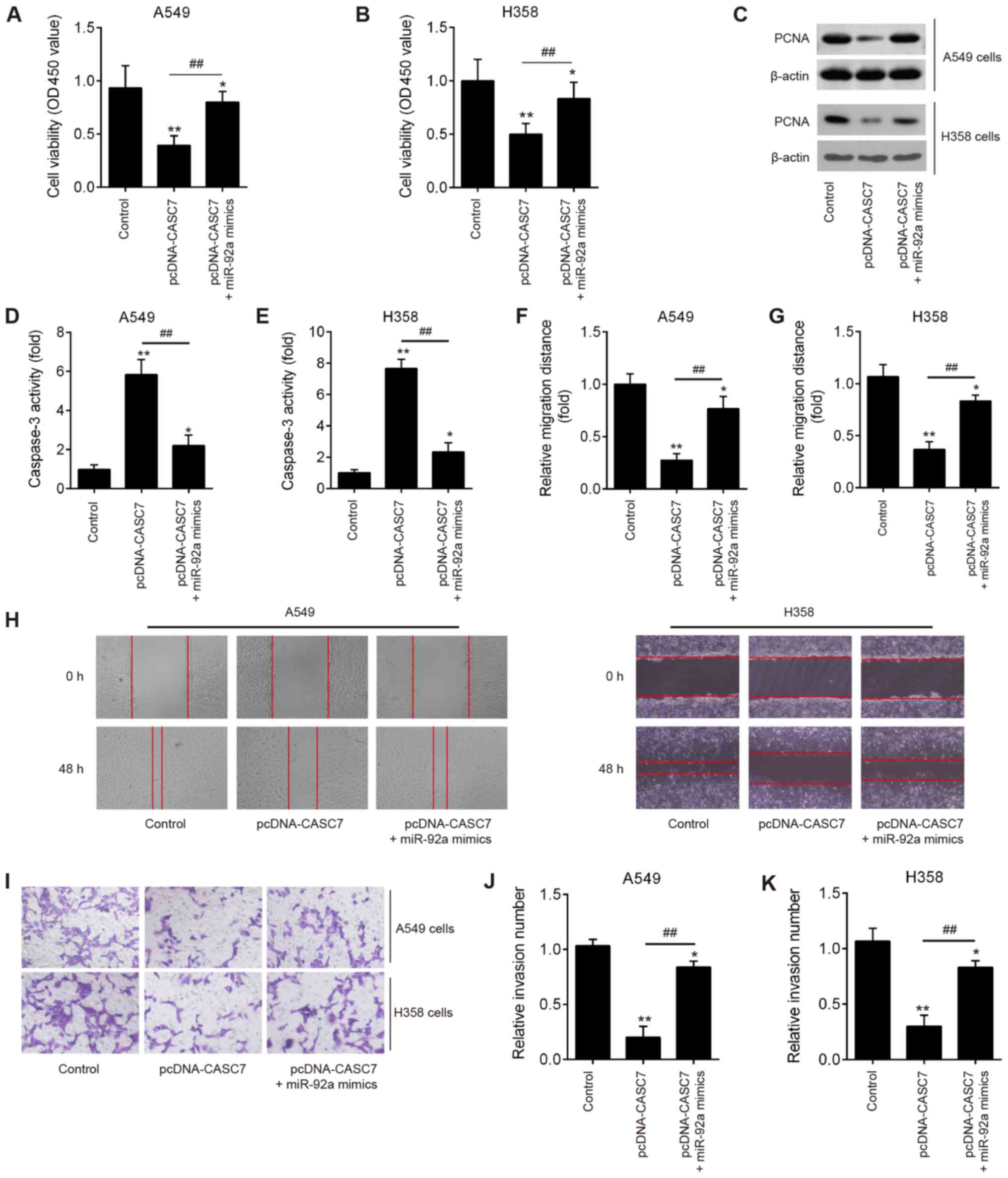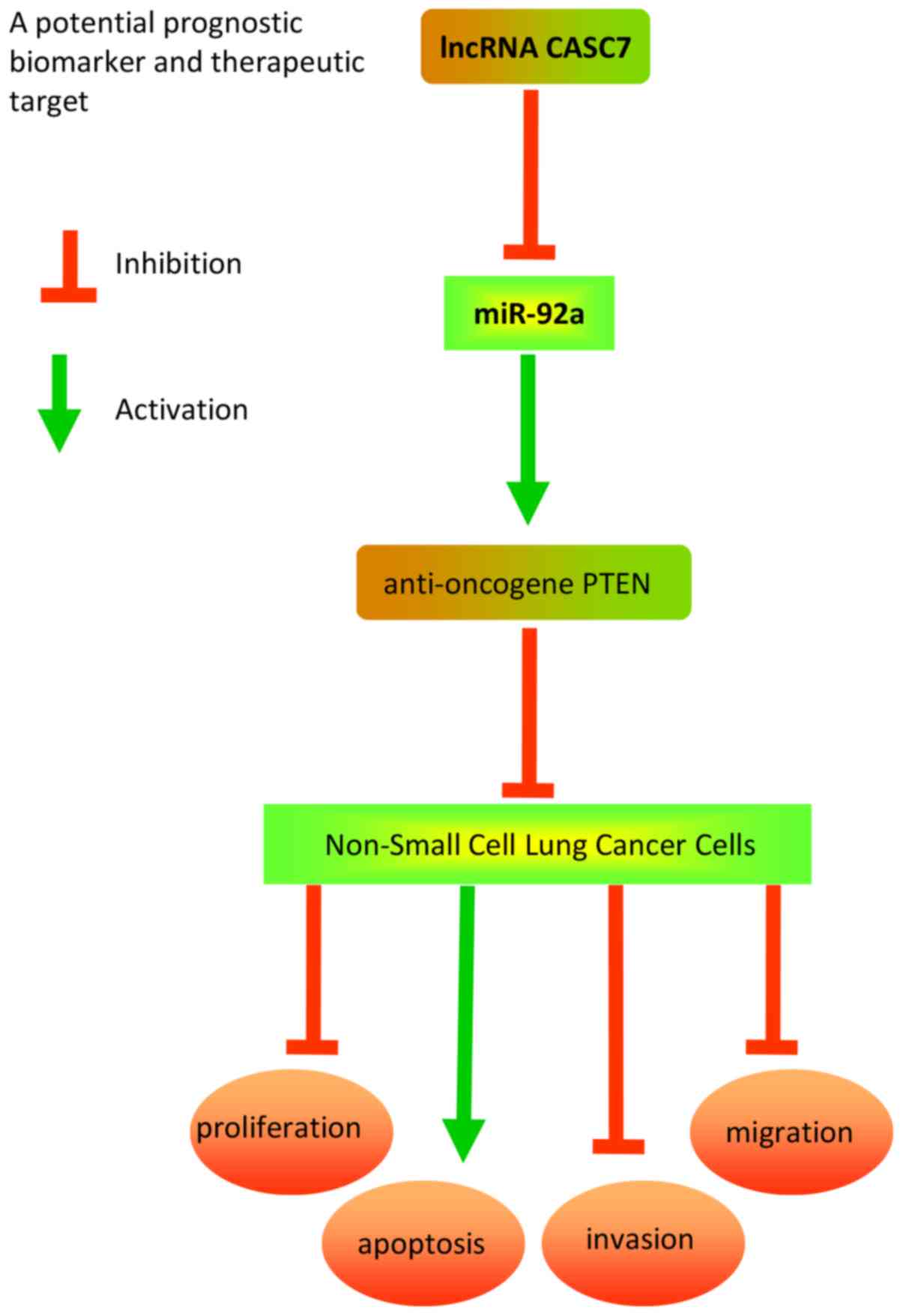|
1
|
Ferlay J, Shin HR, Bray F, Forman D,
Mathers C and Parkin DM: Estimates of worldwide burden of cancer in
2008: GLOBOCAN 2008. Int J Cancer. 127:2893–2917. 2010. View Article : Google Scholar
|
|
2
|
Chen G and Yi XH: Pathology and genetics
of disease and tumours of the lung, pleura in China. Zhonghua Bing
Li Xue Za Zhi. 34:490–493. 2005.In Chinese. PubMed/NCBI
|
|
3
|
Ramalingam SS, Owonikoko TK and Khuri FR:
Lung cancer: New biological insights and recent therapeutic
advances. CA Cancer J Clin. 61:91–112. 2011. View Article : Google Scholar : PubMed/NCBI
|
|
4
|
Mostafa AA and Morris DG: Immunotherapy
for lung cancer: Has it finally arrived? Front Oncol. 4:2882014.
View Article : Google Scholar : PubMed/NCBI
|
|
5
|
Wapinski O and Chang HY: Long noncoding
RNAs and human disease. Trends Cell Biol. 21:354–361. 2011.
View Article : Google Scholar : PubMed/NCBI
|
|
6
|
Wang R, Ma Z, Feng L, Yang Y, Tan C, Shi
Q, Lian M, He S, Ma H and Fang J: LncRNA MIR31HG targets HIF1A and
P21 to facilitate head and neck cancer cell proliferation and
tumori-genesis by promoting cell-cycle progression. Mol Cancer.
17:1622018. View Article : Google Scholar
|
|
7
|
Zeng C, Liu S, Lu S, Yu X, Lai J, Wu Y,
Chen S, Wang L, Yu Z, Luo G and Li Y: The c-Myc-regulated lncRNA
NEAT1 and paraspeckles modulate imatinib-induced apoptosis in CML
cells. Mol Cancer. 17:1302018. View Article : Google Scholar : PubMed/NCBI
|
|
8
|
Wang G, Sun J, Zhao H and Li H: Long
non-coding RNA (lncRNA) growth arrest specific 5 (GAS5) suppresses
esophageal squamous cell carcinoma cell proliferation and migration
by inactivating phosphatidylinositol 3-kinase (PI3K)/AKT/Mammalian
target of rapamycin (mTOR) signaling pathway. Med Sci Monit.
24:7689–7696. 2018. View Article : Google Scholar : PubMed/NCBI
|
|
9
|
Fan YF, Yu ZP and Cui XY: lncRNA
colorectal neoplasia differentially expressed (CRNDE) promotes
proliferation and inhibits apoptosis in non-small cell lung cancer
cells by regulating the miR-641/CDK6 axis. Med Sci Monit.
25:2745–2755. 2019. View Article : Google Scholar : PubMed/NCBI
|
|
10
|
Song Z, Du J, Zhou L and Sun B: lncRNA
AWPPH promotes proliferation and inhibits apoptosis of non-small
cell lung cancer cells by activating the Wnt/β-catenin signaling
pathway. Mol Med Rep. 19:4425–4432. 2019.PubMed/NCBI
|
|
11
|
Zhang Y, Li Y, Han L, Zhang P and Sun S:
SUMO1P3 is associated clinical progression and facilitates cell
migration and invasion through regulating miR-136 in non-small cell
lung cancer. Biomed Pharmacother. 113:1086862019. View Article : Google Scholar : PubMed/NCBI
|
|
12
|
van Heesch S, van Iterson M, Jacobi J,
Boymans S, Essers PB, de Bruijn E, Hao W, MacInnes AW, Cuppen E and
Simonis M: Extensive localization of long noncoding RNAs to the
cytosol and mono- and polyribosomal complexes. Genome Biol.
15:R62014. View Article : Google Scholar : PubMed/NCBI
|
|
13
|
Liu JH, Li C, Zhang CH and Zhang ZH:
LncRNA-CASC7 enhances corticosteroid sensitivity via inhibiting the
PI3K/AKT signaling pathway by targeting miR-21 in severe asthma.
Pulmonology. 26:18–26. 2020. View Article : Google Scholar
|
|
14
|
Liu Y, Pan L, Jiang A and Yin M: Hydrogen
sulfide upregulated lncRNA CasC7 to reduce neuronal cell apoptosis
in spinal cord ischemia-reperfusion injury rat. Biomed
Pharmacother. 98:856–862. 2018. View Article : Google Scholar : PubMed/NCBI
|
|
15
|
Gong X, Liao X and Huang M: LncRNA CASC7
inhibits the progression of glioma via regulating Wnt/β-catenin
signaling pathway. Pathol Res Pract. 215:564–570. 2019. View Article : Google Scholar : PubMed/NCBI
|
|
16
|
Zhang Z, Fu C, Xu Q and Wei X: Long
non-coding RNA CASC7 inhibits the proliferation and migration of
colon cancer cells via inhibiting microRNA-21. Biomed Pharmacother.
95:1644–1653. 2017. View Article : Google Scholar : PubMed/NCBI
|
|
17
|
Salmena L, Poliseno L, Tay Y, Kats L and
Pandolfi PP: A ceRNA hypothesis: The Rosetta Stone of a hidden RNA
language? Cell. 146:353–358. 2011. View Article : Google Scholar : PubMed/NCBI
|
|
18
|
Ji D, Wang Y, Sun B, Yang J and Luo X:
Long non-coding RNAMNX1-AS1 promotes hepatocellular carcinoma
proliferation and invasion through targeting miR-218-5p/COMMD8
axis. Biochem Biophys Res Commun. 513:669–674. 2019. View Article : Google Scholar : PubMed/NCBI
|
|
19
|
Zhou K, Zhang C, Yao H, Zhang X, Zhou Y,
Che Y and Huang Y: Knockdown of long non-coding RNA NEAT1 inhibits
glioma cell migration and invasion via modulation of SOX2 targeted
by miR-132. Mol Cancer. 17:1052018. View Article : Google Scholar : PubMed/NCBI
|
|
20
|
Li H, Guo X, Li Q, Ran P, Xiang X, Yuan Y,
Dong T, Zhu B, Wang L, Li F, et al: Long non-coding RNA1308
promotes cell invasion by regulating the miR-124/ADAM 15 axis in
non-small-cell lung cancer cells. Cancer Manag Res. 10:6599–6609.
2018. View Article : Google Scholar :
|
|
21
|
Livak KJ and Schmittgen TD: Analysis of
relative gene expression data using real-time quantitative PCR and
the 2(-Delta Delta C(T)) method. Methods. 25:402–408. 2001.
View Article : Google Scholar
|
|
22
|
E C, Li C, Li H and Yang J: Silencing of a
novel lncRNA LOC105369748 suppresses the progression of
hepatocel-lular carcinoma by sponging miR-5095 from MBD2. J Cell
Physiol. 234:18504–18512. 2019. View Article : Google Scholar : PubMed/NCBI
|
|
23
|
Jiang F, Qi W, Wang Y, Wang W and Fan L:
lncRNA PEG10 promotes cell survival, invasion and migration by
sponging miR-134 in human bladder cancer. Biomed Pharmacother.
114:1088142019. View Article : Google Scholar : PubMed/NCBI
|
|
24
|
Qi H, Wen B, Wu Q, Cheng W, Lou J, Wei J,
Huang J, Yao X and Weng G: Long noncoding RNA SNHG7 accelerates
prostate cancer proliferation and cycle progression through cyclin
D1 by sponging miR-503. Biomed Pharmacother. 102:326–332. 2018.
View Article : Google Scholar : PubMed/NCBI
|
|
25
|
Yu H, Song H, Liu L, Hu S, Liao Y, Li G,
Xiao X, Chen X and He S: MiR-92a modulates proliferation,
apoptosis, migration and invasion of osteosarcoma cell lines by
targeting Dickkopf-related protein 3. Biosci Rep.
39:BSR201904102019. View Article : Google Scholar
|
|
26
|
Sun L, Jin X, Xie L, Xu G, Cui Y and Chen
Z: Swainsonine represses glioma cell proliferation, migration and
invasion by reduction of miR-92a expression. BMC Cancer.
19:2472019. View Article : Google Scholar : PubMed/NCBI
|
|
27
|
Sun B, Zhang J, Liu M and Guan L: Alkannin
inhibits proliferation, migration and invasion of hepatocellular
carcinoma cells via regulation of miR-92a. Biomed Pharmacother.
114:1087822019. View Article : Google Scholar : PubMed/NCBI
|
|
28
|
Lu C, Shan Z, Hong J and Yang L:
MicroRNA-92a promotes epithelial-mesenchymal transition through
activation of PTEN/PI3K/AKT signaling pathway in non-small cell
lung cancer metastasis. Int J Oncol. 51:235–244. 2017. View Article : Google Scholar : PubMed/NCBI
|
|
29
|
Fang L, Wang X, Sun Q, Papakonstantinou E,
S'ng C, Tamm M, Stolz D and Roth M: IgE Downregulates PTEN through
MicroRNA-21-5p and stimulates airway smooth muscle cell remodeling.
Int J Mol Sci. 20:E8752019. View Article : Google Scholar : PubMed/NCBI
|
|
30
|
Zhang H, Cao H, Xu D and Zhu K:
MicroRNA-92a promotes metastasis of nasopharyngeal carcinoma by
targeting the PTEN/AKT pathway. Onco Targets Ther. 9:3579–3588.
2016.PubMed/NCBI
|
|
31
|
Ke TW, Wei PL, Yeh KT, Chen WT and Cheng
YW: MiR-92a promotes cell metastasis of colorectal cancer through
PTEN-Mediated PI3K/AKT pathway. Ann Surg Oncol. 22:2649–2655. 2015.
View Article : Google Scholar
|
|
32
|
Zhang G, Zhou H, Xiao H, Liu Z, Tian H and
Zhou T: MicroRNA-92a functions as an oncogene in colorectal cancer
by targeting PTEN. Dig Dis Sci. 59:98–107. 2014. View Article : Google Scholar
|
|
33
|
Dong L, Li G, Li Y and Zhu Z: Upregulation
of long noncoding RNA GAS5 inhibits lung cancer cell proliferation
and metastasis via miR-205/PTEN axis. Med Sci Monit. 25:2311–2319.
2019. View Article : Google Scholar : PubMed/NCBI
|
|
34
|
Jin L, Jiang X, He G, Shi J, Su F and Zhu
H: SNHG20 knockdown suppresses proliferation, migration and
invasion, and promotes apoptosis in non-small cell lung cancer
through acting as a miR-154 sponge. Biomed Pharmacother.
112:1086482019. View Article : Google Scholar
|
|
35
|
Zhang MY, Zhang ZL, Cui HX, Wang RK and Fu
L: Long non-coding RNA FENDRR inhibits NSCLC cell growth and
aggressiveness by sponging miR-761. Eur Rev Med Pharmacol Sci.
22:8324–8332. 2018.PubMed/NCBI
|
|
36
|
Shigoka M, Tsuchida A, Matsudo T, Nagakawa
Y, Saito H, Suzuki Y, Aoki T, Murakami Y, Toyoda H, Kumada T, et
al: Deregulation of miR-92a expression is implicated in
hepatocellular carcinoma development. Pathol Int. 60:351–357. 2010.
View Article : Google Scholar : PubMed/NCBI
|
|
37
|
Liu GH, Zhou ZG, Chen R, Wang MJ, Zhou B,
Li Y and Sun XF: Serum miR-21 and miR-92a as biomarkers in the
diagnosis and prognosis of colorectal cancer. Tumour Biol.
34:2175–2181. 2013. View Article : Google Scholar : PubMed/NCBI
|
|
38
|
Wu Q, Yang Z, Wang F, Hu S, Yang L, Shi Y
and Fan D: MiR-19b/20a/92a regulates the self-renewal and
proliferation of gastric cancer stem cells. J Cell Sci.
126:P4220–P4229. 2013. View Article : Google Scholar
|
|
39
|
Zhao YB, Zhao J, Zhang LJ, Shan RG, Sun
ZZ, Wang K, Chen JQ and Mu JX: MicroRNA-370 protects against
myocardial isch-emia/reperfusion injury in mice following
sevoflurane anesthetic preconditioning through PLIN5-dependent PPAR
signaling pathway. Biomed Pharmacother. 113:1086972019. View Article : Google Scholar
|
|
40
|
Ding K, Wu Z, Wang N, Wang X, Wang Y, Qian
P, Meng G and Tan S: MiR-26a performs converse roles in
proliferation and metastasis of different gastric cancer cells via
regulating of PTEN expression. Pathol Res Pract. 213:467–475. 2017.
View Article : Google Scholar : PubMed/NCBI
|
|
41
|
Perumal E, So Youn K, Sun S, Seung-Hyun J,
Suji M, Jieying L and Yeun-Jun C: PTEN inactivation induces
epithelial-mesenchymal transition and metastasis by intranuclear
translocation of β-catenin and snail/slug in non-small cell lung
carcinoma cells. Lung Cancer. 130:25–34. 2019. View Article : Google Scholar : PubMed/NCBI
|
|
42
|
Liu L, Huang L, He J, Cai S, Weng Y, Huang
S and Ma S: PTEN inhibits non-small cell lung cancer cell growth by
promoting G0/G1 arrest and cell apoptosis.
Oncol Lett. 17:1333–1340. 2019.PubMed/NCBI
|
|
43
|
Qin LB, Li ZY, Li H, Fan XQ, Liu HG, Dong
XM and Jia WY: Inhibitive effects of microRNA-34a on protecting
against ischemia-reperfusion injury of vital organs in hemorrhagic
shock pregnant mice. Eur Rev Med Pharmacol Sci. 22:1812–1818.
2018.PubMed/NCBI
|
|
44
|
Xiao J, Yu W, Hu K, Li M, Chen J and Li Z:
MiR-92a promotes tumor growth of osteosarcoma by targeting PTEN/AKT
signaling pathway. Oncol Rep. 37:2513–2521. 2017. View Article : Google Scholar : PubMed/NCBI
|















